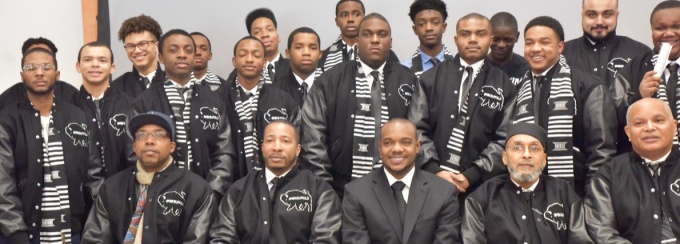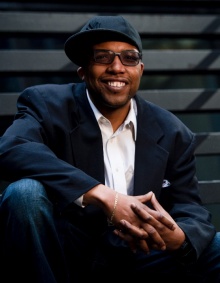Say Yes Buffalo & the School of Social Work

Asst. Prof. Christopher St. Vil (front row, seated, far left) with leadership and participants in the Say Yes Buffalo Breaking Barriers program.
Part of a larger collaboration to help kids finish high school—and get post-secondary schooling too
By Jana Eisenberg
What does it take to make sure that every public school student both graduates from high school and also gets the preparation and support to attain, afford and complete a postsecondary education?
The national nonprofit organization Say Yes to Education has at least one solution, and it’s been working in Buffalo to accomplish that goal since 2011, when it established its second full chapter here after a competitive process.
The Say Yes model includes a deeply embedded, unique local collaboration made up of strongly invested stakeholder contingents—including cities, counties, school districts, institutes of higher education, parents, teachers, administrators, businesses and foundations. From the start, UB was one of those stakeholders, and SSW continues to deepen its intertwined relationship with Say Yes in many meaningful and symbiotic ways.
Early on, said Say Yes Buffalo Executive Director David Rust, UB School of Education students worked through Say Yes to help public and charter school students complete FAFSA and TAP scholarship and aid applications, which is a prerequisite for participation in the program. “Completing the forms helps students access those allocated dollars,” explained Rust. “We would not be where we are without the UB partnership from the beginning.” It’s one marker of success that the application completion rates have risen and stayed higher since Say Yes came on the scene.
And the connections with UB have become more and more positively entwined as Say Yes and its partners put in the years of work required to attain their sweeping goals.
Among the many forms the Say Yes/UBSSW relationship takes: our degree students intern with the organization, and participate in field work with staff in the Buffalo Public Schools. Various UBSSW faculty members help to analyze and apply results from data, monitor programs, and provide trainings. Say Yes hires graduates of our program, and the MSW program has become a continuing education resource for Say Yes staff.
Clinical Assistant Professor Michael Lynch, MSW ’10, personifies the relationship. Post– UBSSW MSW, he was hired by Say Yes as a site facilitator supervisor. Now, as a member of the SSW faculty, he oversees our field work program, placing dozens of MSW students yearly with the Buffalo Public Schools and Say Yes, and continues to be intrinsically involved with Say Yes, consulting on data management and storage, as well as conducting research on strategies that engage high-risk families.
Lynch agreed that the relationship between Say Yes and UBSSW is an important and effective one. “We all want to do whatever we can to make sure young people in Buffalo have a chance at success,” said Lynch. “There are so many barriers and systems that perpetuate the problems. When you find partners who share your values, it’s easier to work together.
Rust also concurred that a united front, as well as an unusual organizational power structure, contribute to the measurable successes being attained. “Say Yes uses a collective impact model, which is very different than traditional nonprofits,” he said. “We’re creating partnerships with common goals, and we do it all together. There’s no one person or group in charge. The partners allocate things like time, political will, and financial resources; it’s not always easy, so it’s essential to have an agreed upon strategy.”
“This only works if the partners put aside their doubts, and I give full credit for some of the significant contributions,” continued Rust. “Buffalo Mayor Byron Brown put a lot of resources into the public schools, which he did not have to do; the County allowed mental health services delivery in the school system—that’s also not required. And the school system itself has embraced [Superintendent Kriner Cash’s] New Education Bargain. This reallocation of resources on behalf of common goals can be fragile, and it takes time and kindness to build trust and respect.”
Tabatha Lumley, MSW ’14, provides some of those services that Rust was referring to—services that are also foundational to the success of Say Yes in making sure that students stay in school, stay mentally and physically healthy, learn what they need to learn, and graduate.
Lumley is a Say Yes school social worker, placed at P.S. 27 Hillery Park Elementary. “Through the Say Yes and School of Social Work relationship, I’m out here working on macro, mezzo, and micro levels,” said Lumley.
“With the skills I gained through the MSW program, I’m able to assist children and families. I know how to work with them, to set achievable goals, to do interventions when they’re required—all using solution-focused and trauma-informed care.”
“During the week, or when I’m not there, the school nurse, assistant principal, and principal regularly call me,” she said. “The kids trust me; I have relationships with them, and they want to talk to me. We’re dealing with families, sometimes around things like sexual abuse and addiction. I’ve learned so much from being a social worker at Say Yes, and I’m proud to be one of the people representing the School of Social Work in the community.”
The future of the initiative looks solid for now, with a Gates Foundation investment designated to various partners to develop transitional curriculum and so that recent Say Yes scholars can help influence their younger counterparts. Say Yes Buffalo administration and staff, currently around 100 strong, will move to a new East Side building on Jefferson Avenue. “There are areas that we can grow, and will continue to fill gaps to better serve our students,” said Rust. “We’re in an endowment campaign, and have already raised $39.7 million from our very generous community.”
UBSSW’s Lynch agreed that there’s room for extending and expanding the program—again to benefit all parties. “We hope this relationship continues to evolve. Say Yes is innovative; they’re working with different populations using a variety of interventions,” he affirmed. “The School of Social Work would like to continue to expand this on many levels—researching that innovative work; providing field placements where School of Social Work students help further the Say Yes mission, and grow and develop along the way themselves.”
Q&A with Christopher St. Vil

Assistant Professor Christopher St. Vil is active with the Say Yes Breaking Barriers program, which he began after meeting program coordinators Pastor Tommy McClam and Daniel Robertson; the work is in line with his social work research interests, which focus on interventions for black males. “Their intervention is a specific form of mentoring and I wanted to be a part of it,” he said.
How are you involved with Breaking Barriers?
I am evaluating their program and helping generate data to demonstrate their effectiveness.
Why is this interaction with Say Yes important?
Exploring whether and how Breaking Barriers is impactful in reducing negative outcomes experienced by black males is important to inform other efforts.
Why is it important to foster collaboration between universities and community organizations in general?
Universities must form effective, reciprocal relationships where they are, to conduct research that may improve conditions in that community. As long as the relationship is not coercive, and the university shares the benefits of conducting community research with the community, it’s a win-win.
How does the relationship between UBSSW and Say Yes affect your professional life?
It has enriched it. I interact with Breaking Barriers participants regularly; we’ll be soon presenting some evidence that we hope to publish. I feel privileged to work with them. And it’s up to me to prove the value and worth of collaborating with the UBSSW.